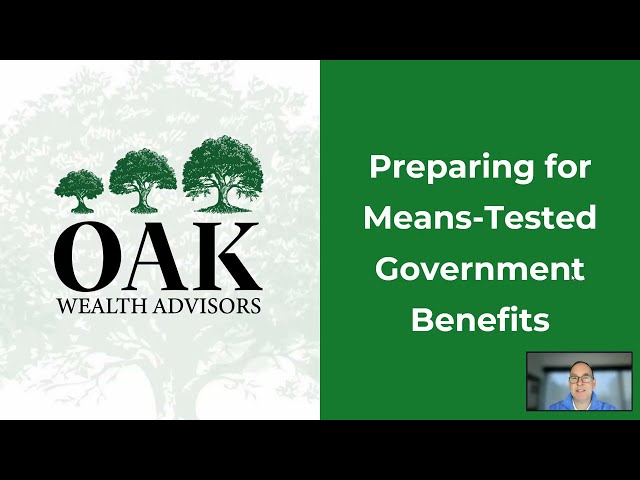What Families Should Know About Asset Limits for Disability Benefits
Full Transcript
Hi, I’m Mike Walther with Oak Wealth Advisors. Today I want to share some tips for
understanding the asset tests related to acquiring and keeping means-tested benefits. It’s
important to recognize that for many governmental benefit programs available to our loved ones
with disabilities, eligibility is tied to how many assets the individual owns. These tests apply to
programs such as Supplemental Security Income (SSI), which is a cash benefit; Medicaid, which
provides both health insurance and a variety of waiver-based supports; and the Supplemental
Nutrition Assistance Program (SNAP), formerly known as food stamps, which helps provide
food assistance.
Asset limits vary depending on both the specific benefit program and the state in which you live.
However, the baseline federal asset limit for SSI is $2,000 in every state. Medicaid limits differ
by state, but generally, in order to maintain eligibility for means-tested programs, the goal is to
ensure that the individual with a disability keeps their countable assets below $2,000 on an
ongoing basis.
So what counts as an asset? Unfortunately, almost everything. You’ll want to review any
accounts or resources that your loved one may own to ensure that they either do not hold these
assets or hold very small amounts. The combined value of all countable resources cannot exceed
$2,000 when applying for or maintaining means-tested benefits. Countable assets include
checking and savings accounts (whether joint or individual), retirement accounts such as IRAs,
401(k)s, and 403(b)s, investment accounts holding stocks, bonds, mutual funds, or even gold,
and any trust—revocable or irrevocable—from which the individual can demand distributions.
Custodial accounts like UTMA or UGMA accounts, which typically transfer to the individual at
age 18 or 21 depending on the state, also count. Life insurance policies with cash value and
certain annuities can count as well.
This list makes it clear that families need to look carefully to ensure their loved one doesn’t hold
these types of assets when applying for benefits, and once benefits are approved, that their
accounts do not exceed $2,000 by the end of any month.
There are, however, certain assets an individual can own without affecting eligibility. A car and a
home of any value are excluded from the asset test. Assets held within a Special Needs Trust,
also called a Supplemental Needs Trust, are also excluded—provided the individual cannot
demand distributions and all distributions are made at the trustee’s discretion. Additionally,
funds held in an ABLE account are excluded up to $100,000; once the account exceeds that
threshold, the amount above $100,000 begins counting toward the $2,000 limit.
Keep these guidelines in mind as you work to secure benefits for your loved one. If you have any
questions about benefit planning—whether related to means-tested benefits or other areas—
please reach out to your advisor at Oak Wealth Advisors. We also encourage you to listen to our
Special Needs Voice podcast for new ideas and insights within the disability planning
community, and follow us on social media. We look forward to hearing from you and supporting
you with all your planning needs.





